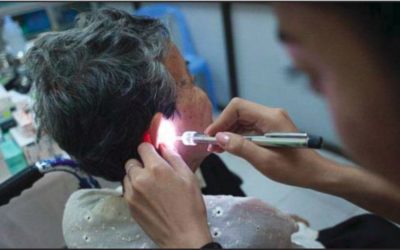The Charitable Foundation has supported the work of All Ears Cambodia since July 2016 and the following is the story of one of the patients helped through the program.
Chreng Kannika is a seventy-one year old woman originally from Prey Veng province. She has recurrent chronic middle ear disease in her right ear. She has had ear infections for most of her life and remembers the problem starting somewhere in early childhood. As a girl in rural Cambodia, her problem was almost considered normal – something most kids had – as many children in her village suffered with similarly discharging ears. Indeed, chronic otitis media (chronic middle ear disease) is frequently met in children (and adults) by our clinical team. Its effects, however, can be devastating. The disease, which is a culmination of chronic infection within the middle ear space, a perforated eardrum and recurrent discharge of pus, causes significant long-term effects on early communication, language development, and educational progress. This in turn can lead to loss of vocational opportunities and economic hardship.
Owing to its proximity, the spread of infection beyond the middle ear can extend to other structures such as the meninges and brain. The effects can be life-threatening – extradural abscess, brain abscess, subdural abscess, sigmoid sinus thrombophlebitis, otitic hydrocephalus, and meningitis, are all potentially fatal consequences of long-standing middle ear disease.
All Ears Cambodia (AEC) picked up on Kannika’s problems when she was seen for her first consultation in Phnom Penh. Her condition was so advanced that not only had she lost most of her hearing in her right ear, the disease had also eaten away at the small bones inside her middle ear. The underlying infection was curbed and a careful eye is being kept on her progress.

Adding further to her burden, Kannika now suffers the effects of age-related hearing loss (presbyacusis). Older people are particularly vulnerable to hearing problems. The ageing process is the commonest cause of inner ear damage in adults. Most people over sixty are affected. Presbyacusis is a degenerative process affecting both ears. Although the degree of disability varies from one individual to the next, for many older people this form of hearing loss brings anxiety, loneliness and depression. It results from irreversible biochemical changes within the inner ear. The resulting structural damage to highly complex sensory cells causes sensorineural hearing loss. This type of loss may have serious effects on the individual’s ability to hear and understand speech. The vital components of speech, usually high frequency consonants, are lost. To older listeners, sounds may seem distorted and voices difficult to understand. They may experience further problems in situations where speech is imbedded in background noise, or where there is more than one speaker. Many have the associated phenomenon known as cochlear recruitment, which can lead to moderately loud noise becoming physically uncomfortable, even painful. Whilst the main cause of presbyacusis is ageing, factors such as genetic predisposition, heart disease, excessive noise, poor nutrition, and previous middle ear infections, may also play a role. Hearing loss caused by presbyacusis is permanent and cannot be reversed with medicine or surgery. It can, however, be treated using appropriate hearing aids.
In Kannika’s case wearing a hearing aid on her right ear proves difficult as using a hearing aid is contraindicated by middle ear infection. She can, however, wear a hearing aid on the left ear and her overall degree of hearing loss is significantly disabling that she desperately needs amplification in order to communicate and hear others. Accordingly, AEC went through the appropriate steps of aural rehabilitation and she was duly fitted with a post aural hearing aid. She was seen again some four weeks on for her follow-up appointment. Kannika reported that she hadn’t heard her family or friends properly in years. She remarked that to hear clearly again was something she thought she would never experience again; something lost forever. She said she was now able to understand conversation more and felt more confident in joining in when others are talking.
(The name of the person has been changed for purposes of patient confidentiality and the picture does not portray Ms Kannika)


